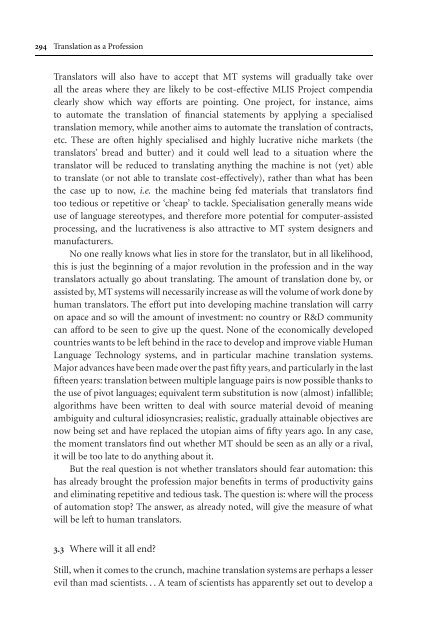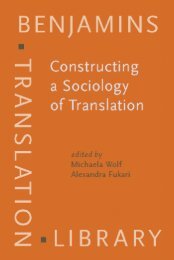- Page 2 and 3:
Translation as a Profession
- Page 4:
Translation as a ProfessionDaniel G
- Page 7 and 8:
VITranslation as a Profession1.1 Be
- Page 9 and 10:
VIII Translation as a Profession7.9
- Page 11 and 12:
XTranslation as a Profession4. With
- Page 13:
XIITranslation as a ProfessionSecti
- Page 16:
ForewordXVthey offer, their work or
- Page 20 and 21:
chapter 1An overviewIt is posited h
- Page 22 and 23:
Chapter 1. An overview 53. Thenatur
- Page 24 and 25:
Chapter 1. An overview 7- concepts
- Page 27 and 28:
10 Translation as a Professioncase,
- Page 29 and 30:
12 Translation as a ProfessionTrans
- Page 31 and 32:
14 Translation as a Profession4. Th
- Page 33 and 34:
16 Translation as a Professionmessa
- Page 35 and 36:
18 Translation as a Professionall t
- Page 37 and 38:
20 Translation as a Professionprint
- Page 39 and 40:
22 Translation as a Professioncompa
- Page 41 and 42:
24 Translation as a Profession8.6 Q
- Page 43 and 44:
26 Translation as a Professionpanie
- Page 45 and 46:
28 Translation as a Professionrathe
- Page 47 and 48:
30 Translation as a Professioncommo
- Page 49 and 50:
32 Translation as a ProfessionAll t
- Page 51 and 52:
34 Translation as a ProfessionA cer
- Page 53 and 54:
36 Translation as a Profession2.3.4
- Page 55 and 56:
38 Translation as a ProfessionThis
- Page 57 and 58:
40 Translation as a Profession11. T
- Page 59 and 60:
42 Translation as a Profession17. T
- Page 61 and 62:
44 Translation as a Profession2. Th
- Page 63 and 64:
46 Translation as a ProfessionSo fa
- Page 65 and 66:
48 Translation as a Professionthat
- Page 67 and 68:
50 Translation as a Professionparti
- Page 69 and 70:
52 Translation as a ProfessionThe a
- Page 71 and 72:
54 Translation as a ProfessionThe w
- Page 73 and 74:
56 Translation as a Profession- the
- Page 75 and 76:
58 Translation as a ProfessionThe p
- Page 77 and 78:
60 Translation as a Profession15. A
- Page 79 and 80:
62 Translation as a Profession2.2 O
- Page 81 and 82:
64 Translation as a Profession- a l
- Page 83 and 84:
66 Translation as a ProfessionA ver
- Page 85 and 86:
68 Translation as a Professionf) Th
- Page 87 and 88:
70 Translation as a ProfessionWhile
- Page 89 and 90:
72 Translation as a Profession4.5 D
- Page 91 and 92:
74 Translation as a ProfessionThe t
- Page 93 and 94:
76 Translation as a ProfessionThe t
- Page 95 and 96:
78 Translation as a Profession110.
- Page 97 and 98:
80 Translation as a Professionsites
- Page 99 and 100:
82 Translation as a Profession150.
- Page 102:
section IIThe translating professio
- Page 105 and 106:
88 Translation as a Profession- www
- Page 107 and 108:
90 Translation as a Professionsingl
- Page 109 and 110:
92 Translation as a Professionspell
- Page 111 and 112:
94 Translation as a Professionperfo
- Page 113 and 114:
96 Translation as a Profession- gua
- Page 115 and 116:
98 Translation as a ProfessionHavin
- Page 117 and 118:
100 Translation as a Profession2.3
- Page 119 and 120:
102 Translation as a Professioncoun
- Page 121 and 122:
104 Translation as a Profession3. T
- Page 123 and 124:
106 Translation as a Profession3.3
- Page 125 and 126:
108 Translation as a Professiontran
- Page 127 and 128:
110 Translation as a Profession- he
- Page 129 and 130:
112 Translation as a Profession- of
- Page 131 and 132:
114 Translation as a Profession- an
- Page 133 and 134:
116 Translation as a Professionon t
- Page 135 and 136:
118 Translation as a Profession- de
- Page 137 and 138:
120 Translation as a Profession5.5
- Page 139 and 140:
122 Translation as a ProfessionTran
- Page 141 and 142:
124 Translation as a ProfessionThe
- Page 143 and 144:
126 Translation as a Profession- mo
- Page 145 and 146:
128 Translation as a Professionand
- Page 147 and 148:
130 Translation as a Professionthey
- Page 149 and 150:
132 Translation as a Professionnotb
- Page 151 and 152:
134 Translation as a Professionthe
- Page 153 and 154:
136 Translation as a Professionwhat
- Page 155 and 156:
138 Translation as a Professionof s
- Page 157 and 158:
140 Translation as a Professionand
- Page 159 and 160:
142 Translation as a Profession-
- Page 161 and 162:
144 Translation as a ProfessionUnti
- Page 164:
section IIIBecoming a translator
- Page 167 and 168:
150 Translation as a Profession1. P
- Page 169 and 170:
152 Translation as a ProfessionNati
- Page 171 and 172:
154 Translation as a ProfessionICT
- Page 173 and 174:
156 Translation as a Professiondoes
- Page 176 and 177:
chapter 6The die is cast!Alternativ
- Page 178 and 179:
Chapter 6. The die is cast! 161- St
- Page 180 and 181:
Chapter 6. The die is cast! 163tran
- Page 182 and 183:
Chapter 6. The die is cast! 165Ther
- Page 184 and 185:
Chapter 6. The die is cast! 1672.2
- Page 186 and 187:
Chapter 6. The die is cast! 1693. C
- Page 188 and 189:
Chapter 6. The die is cast! 171- be
- Page 190 and 191:
Chapter 6. The die is cast! 173Ther
- Page 192 and 193:
Chapter 6. The die is cast! 1753.1.
- Page 194 and 195:
Chapter 6. The die is cast! 177- Sc
- Page 196 and 197:
Chapter 6. The die is cast! 179Cost
- Page 198 and 199:
Chapter 6. The die is cast! 181∗
- Page 200 and 201:
Chapter 6. The die is cast! 183A ma
- Page 202 and 203:
Chapter 6. The die is cast! 185∗
- Page 204 and 205:
chapter 7Here we go!Finding (and ho
- Page 206 and 207:
Chapter7. Herewego! 189always bette
- Page 208 and 209:
Chapter7. Herewego! 1911.2 Rely on
- Page 210 and 211:
Chapter7. Herewego! 193Translators
- Page 212 and 213:
Chapter7. Herewego! 195just right f
- Page 214:
section IVBeing a translatorCurrent
- Page 217 and 218:
200 Translation as a Professionoffe
- Page 219 and 220:
202 Translation as a Profession2.1
- Page 221 and 222:
204 Translation as a Professionhour
- Page 223 and 224:
206 Translation as a Profession- sp
- Page 225 and 226:
208 Translation as a Profession- Wh
- Page 227 and 228:
210 Translation as a ProfessionSala
- Page 229 and 230:
212 Translation as a Profession‘f
- Page 231 and 232:
214 Translation as a Professionhow.
- Page 233 and 234:
216 Translation as a Profession- th
- Page 235 and 236:
218 Translation as a Profession- An
- Page 237 and 238:
220 Translation as a Profession- ne
- Page 239 and 240:
222 Translation as a Professionpeop
- Page 241 and 242:
224 Translation as a ProfessionThis
- Page 243 and 244:
226 Translation as a Professionmore
- Page 245 and 246:
228 Translation as a Profession- sp
- Page 247 and 248:
230 Translation as a Professionclou
- Page 249 and 250:
232 Translation as a Professionunem
- Page 252 and 253:
chapter 10Professional ethicsIntrod
- Page 254 and 255:
Chapter 10. Professional ethics 237
- Page 256:
Chapter 10. Professional ethics 239
- Page 259 and 260: 242 Translation as a Profession2. T
- Page 262 and 263: chapter 12RecognitionQualifications
- Page 264 and 265: Chapter 12. Recognition 247provinci
- Page 266 and 267: Chapter 12. Recognition 249fessiona
- Page 268 and 269: Chapter 12. Recognition 251tests (a
- Page 270 and 271: Chapter 12. Recognition 2533.1 Agai
- Page 272 and 273: Chapter 12. Recognition 2555. They
- Page 274 and 275: Chapter 12. Recognition 2571 (yes,
- Page 276: Chapter 12. Recognition 259of trans
- Page 280 and 281: chapter 13From P & P to WS & ATTFro
- Page 282 and 283: Chapter13. FromP&PtoWS&ATT 2653. Te
- Page 284 and 285: Chapter13. FromP&PtoWS&ATT 267edito
- Page 286 and 287: Chapter13. FromP&PtoWS&ATT 269- pro
- Page 288 and 289: Chapter13. FromP&PtoWS&ATT 271Termi
- Page 290 and 291: Chapter13. FromP&PtoWS&ATT 273syste
- Page 292 and 293: Chapter13. FromP&PtoWS&ATT 275diffe
- Page 294 and 295: Chapter13. FromP&PtoWS&ATT 277From
- Page 296 and 297: Chapter13. FromP&PtoWS&ATT 279- man
- Page 298 and 299: chapter 14From manual to automaticI
- Page 300 and 301: Chapter 14. From manual to automati
- Page 302 and 303: Chapter 14. From manual to automati
- Page 304 and 305: Chapter 14. From manual to automati
- Page 306 and 307: Chapter 14. From manual to automati
- Page 308 and 309: Chapter 14. From manual to automati
- Page 312: Chapter 14. From manual to automati
- Page 315 and 316: 298 Translation as a Profession- pr
- Page 317 and 318: 300 Translation as a Profession- sp
- Page 319 and 320: 302 Translation as a ProfessionObvi
- Page 321 and 322: 304 Translation as a Profession1.9
- Page 323 and 324: 306 Translation as a ProfessionThe
- Page 325 and 326: 308 Translation as a Profession- it
- Page 327 and 328: 310 Translation as a Professionthe
- Page 329 and 330: 312 Translation as a Professionwher
- Page 331 and 332: 314 Translation as a Professionthei
- Page 333 and 334: 316 Translation as a Profession- th
- Page 335 and 336: 318 Translation as a Professioncult
- Page 337 and 338: 320 Translation as a Professionleve
- Page 339 and 340: 322 Translation as a ProfessionIf y
- Page 342: section VITraining translators
- Page 345 and 346: 328 Translation as a Professioneryo
- Page 347 and 348: 330 Translation as a Profession- Sp
- Page 349 and 350: 332 Translation as a Profession- ca
- Page 351 and 352: 334 Translation as a Professionare
- Page 353 and 354: 336 Translation as a Profession3. S
- Page 355 and 356: 338 Translation as a Profession- tw
- Page 357 and 358: 340 Translation as a Profession5. A
- Page 359 and 360: 342 Translation as a Profession- th
- Page 361 and 362:
344 Translation as a ProfessionIn e
- Page 363 and 364:
346 Translation as a ProfessionAll
- Page 365 and 366:
348 Translation as a ProfessionThe
- Page 367 and 368:
350 Translation as a Professionindu
- Page 369 and 370:
352 Translation as a Profession4. e
- Page 371 and 372:
354 Translation as a ProfessionAcad
- Page 373 and 374:
356 Translation as a Professionlivi
- Page 375 and 376:
358 Translation as a Professionprac
- Page 377 and 378:
360 Translation as a Professionwill
- Page 379 and 380:
362 Translation as a Professionfor
- Page 381 and 382:
364 Translation as a Professionthe
- Page 383 and 384:
366 Translation as a Professionof t
- Page 386 and 387:
PostfaceThere’sstillhopeyet...Let
- Page 388:
Postface 371Just like that funny-lo
- Page 391 and 392:
374 Translation as a ProfessionBrok
- Page 393 and 394:
376 Translation as a ProfessionIcon
- Page 395 and 396:
378 Translation as a ProfessionPara
- Page 397 and 398:
380 Translation as a ProfessionQual
- Page 399 and 400:
382 Translation as a ProfessionSour
- Page 401 and 402:
384 Translation as a ProfessionTran
- Page 404:
Further reading (and browsing)www.e
- Page 407 and 408:
390 Translation as a Professioncomp
- Page 409 and 410:
392 Translation as a Professioninte
- Page 411 and 412:
394 Translation as a Professionqual
- Page 413 and 414:
396 Translation as a Professiontran
- Page 415 and 416:
46 Brunette, Louise, Georges Bastin
















